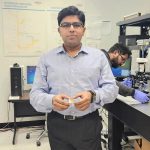
Promising UCF technology is illuminating new ways to examine molecules with precision, an advancement that can help enhance drug development and new therapies.
The new technology, a plasmonic platform that significantly improves the detection of the chirality of molecules, was developed by UCF NanoScience Technology Center Professor Debashis Chanda. The work is detailed in a new study published in Science Advances.
Chiral molecules are like pairs of molecules that are similar in structure but are twisted differently (left or right), similar to how a person’s left and right hands are mirror images of each other.
Understanding the nature of chiral molecules is central to biological and pharmaceutical research because the mirror image pairs — known as enantiomers — can each have different effects in the body or in chemical reactions.
Nearly 56% of all modern drugs and medicine are chiral in nature and about 90% of those are a mixture containing equal amounts of two enantiomers of a chiral compound.
Read article from UCF Today.
By Eddy Duryea | March 13, 2024
